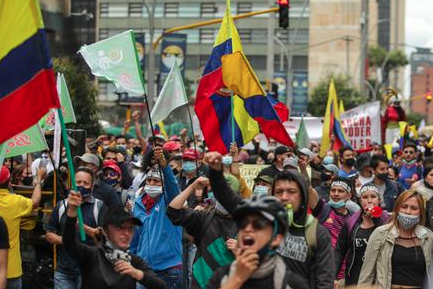
May 7, 2021 | News
The Colombian Commission of Jurists (CCJ) and the ICJ have called upon national and local authorities to respect the right of peaceful assembly and cease all use of unlawful force against protestors immediately.
Beginning 28 April, thousands of people have taken to the streets in towns and cities throughout Colombia to protest and the social and economic policies of the current national government. As of this writing the protests continue.
The CCJ and the ICJ have expressed their concern about widespread and serious human rights violations committed during the protests.
There are multiples reports from civil society organizations that document incidents where police officials have opened fire with live ammunition against protestors.
Although full and precise figures are unavailable, as of 6 May 2021, according to the Ombudspersons’ Office at least 26 people had lost their lives. In at least 11 cases, police officials were allegedly responsible for the killings.
The NGO Temblores has documented 37 killings and the NGO Indepaz has information of more than 1.200 people injured during the protests. In addition, a number of cases of sexual violence have been reported.
The organizations are especially concerned that there are substantial number of people whose whereabouts are unknown. Complete figures on possible disappeared persons are not available. Even more worrisome, there are substantial differences among the figures provided by different sources.
In this regard, for instance, the Ombudspersons’ Office said that it has received information about the possible disappearance of 145 people. The Ombudspersons’ Office has established the whereabout of 55 people.
For its part, the civil society platform Mesa de Trabajo sobre Desaparición Forzada en Colombia has informed that it has information of 471 potential cases of enforced disappearances. According to the platform, the whereabout of 92 people have been determined.
The violent acts committed in Valle del Cauca are particularly serious. In this region, it has been reported that at least 17 people have died, and an undetermined number of people are seriously wounded.
Similarly, in Cali, some members of human rights organizations and the Office of the United Nations High Commissioner for Human Rights in Colombia alleged that they had been subject to verbal attacks and physical assault when there were verifying the situation of detained people.
The CCJ and the ICJ urge Colombian authorities to acknowledge act to address the allegations of human violations committed during the protests. They must conduct, independent, impartial, prompt, thorough, effective, and transparent investigations in accordance with Colombian law and its obligations under the International Covenant on Civil and Political Rights.
Furthermore, the investigation must take place within the ordinary criminal jurisdiction and under no circumstances should there be resort to military jurisdiction. Under international law and standards, cases that may constitute arbitrary deprivation of life or enforced disappearances cannot be considered to be connected with military duties.
Additionally, there is information that some police officials have been wounded, and at least one was allegedly unlawfully killed. The CCJ and the ICJ condemn these and other violent acts and urge judicial authorities to investigate and sanctions those responsible.
On the other hand, the CCJ and the ICJ recall that the use of force by police officials should must only be deployed in accordance with international standards. In particular, any such action must comply with the UN Basic Principles on the Use of Force and Firearms by Law Enforcement Officials.
These Principles establish that the use of force should be exceptional, necessary and proportional. Especially, authorities should faithfully comply with principle 9 that sets out that lethal force should be not used “except in self-defence or defence of others against the imminent threat of death or serious injury”.
Finally, the CCJ and the ICJ express their great concern about the national government’s decision to involve the military forces for the contention of the violence under the legal figure of “military assistance” (asistencia militar). The decision does not respect the international human rights law standards on the use of force and the right of peaceful assembly.
It should be remembered that military forces are not trained or designed to protect and control civilians during protests or scenarios of disruption of public order.
Therefore, the participation of military forces should be exceptional in situations of necessity, for example to confront immediate extreme violence and temporally limited, as affirmed by international bodies such as the UN Committee on Human rights and the Inter-American Court of Human Rights.
Contacts:
Ana María Rodríguez, Deputy Director of the Colombian Commission of Jurists, anarodriguez(a)coljuristas.org
Rocío Quintero M, Latin American Legal and Policy Adviser, International Commission of Jurists, rocio.quintero(a)icj.org
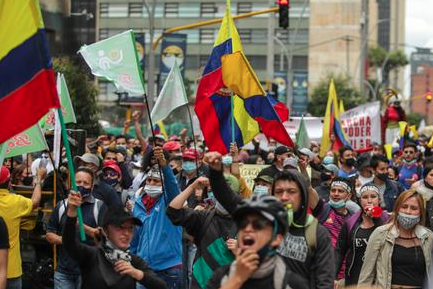
May 6, 2021 | Noticias
La Comisión Colombiana de Juristas (CCJ) y la CIJ solicitan a las autoridades nacionales y locales que respeten el derecho fundamental a la protesta y paren de manera inmediata las acciones violentas en contra de los manifestantes.
Desde el pasado 28 de abril de 2021, en varias ciudades y municipios, miles de personas han salido a las calles a protestar y manifestar su descontento por varias políticas sociales y económicas del actual gobierno. La CCJ y la CIJ expresan su preocupación por las graves violaciones a los derechos humanos cometidas en el marco de estas protestas.
Varios reportes de organizaciones de la sociedad civil muestran que miembros de la Policía han abierto fuego contra personas que estaban protestando. Aunque las autoridades no han entregado información precisa, la Defensoría del Pueblo informó el 5 de mayo que 24 personas habían muerto. En al menos 11 casos, el responsable sería la Policía Nacional. Por su parte, la ONG Temblores ha reportado que al menos 31 personas han sido asesinadas y la ONG Indepaz ha documentado que hay más de 1.200 personas heridas.
También resulta preocupante la cifra de personas cuyo paradero se desconoce. Al respecto, la Defensoría del Pueblo reportó haber recibido información de la desaparición de 89 personas en distintas ciudades como Bogotá, Medellín, Barranquilla y Cali, y varias organizaciones de derechos humanos tienen información de más casos de personas cuyo paradero se desconoce. Adicionalmente, se han denunciado casos de violencia sexual.
De particular gravedad resultan los hechos de violencia ocurridos en el Valle del Cauca, en donde al menos 17 personas han muerto y otras personas han sido gravemente heridas. Asimismo, en Cali, varias organizaciones de derechos humanos y personal de la Oficina de la Alta Comisionada para los Derechos Humanos denunciaron haber sido agredidos física y verbalmente cuando se encontraban verificando la situación de las personas detenidas.
La CCJ y la CIJ instan a las autoridades colombianas a reconocer los abusos y las violaciones de derechos humanos cometidas en el marco de las protestas, así como a llevar a cabo investigaciones independientes, imparciales, prontas, rigurosas, efectivas, creíbles y transparentes por los hechos que constituyen violaciones a los derechos humanos de acuerdo con las obligaciones internacionales del Estado consagradas en el Pacto Internacional de Derechos Civiles y Políticos.
Además, estas investigaciones deben ser adelantadas por la jurisdicción ordinaria y no por la jurisdicción penal militar. En ninguna circunstancia puede considerarse que posibles desapariciones forzadas o ejecuciones extrajudiciales o arbitrarias sean actos que guarden conexión con la disciplina o la misión castrense.
Igualmente, hay información acerca de que varios policías han sido heridos y que al menos uno ha fallecido. La CIJ y la CCJ rechazan estos y otros actos de violencia que han ocurrido e instan a las autoridades judiciales a investigar y sancionar estas conductas.
Por otro lado, la CCJ y la CIJ insisten en que el uso de la fuerza por parte de la policía debe ser acorde a los estándares internacionales. En particular, las autoridades deben respetar lo establecido en los “Principios Básicos sobre el Empleo de la Fuerza y de Armas de Fuego por los Funcionarios Encargados de Hacer Cumplir la Ley”, que determinan que el uso de la fuerza deber ser excepcional, necesario y proporcional.
Especialmente, las autoridades deben dar fiel cumplimiento al principio 9 que determina que la fuerza letal solo puede usarse “en defensa propia o de otras personas, en caso de peligro inminente de muerte o lesiones graves”.
Finalmente, la CCJ y la CIJ manifiestan su gran preocupación con la decisión del gobierno nacional de involucrar a las fuerzas militares en la contención de la violencia, a través de la figura de “asistencia militar”. Esta decisión desconoce los estándares internacionales que rigen el uso de la fuerza y el derecho a la protesta.
Debe recordarse que estas fuerzas no están capacitadas ni diseñadas para garantizar la protección y control de civiles en el marco de protestas sociales o de alteración del orden público. Por ello, su intervención debe ser absolutamente excepcional (violencia extrema) y temporal. Así lo han señalado distintas instancias internacionales, como el Comité de Derechos Humanos y la Corte Interamericana de Derechos Humanos.
Contacto:
Ana María Rodríguez, subdirectora de la Comisión Colombiana de Juristas, anarodriguez(a)coljuristas.org
Rocío Quintero M, Asesora Legal para América Latina de la Comisión Internacional de Juristas, rocio.quintero(a)icj.org
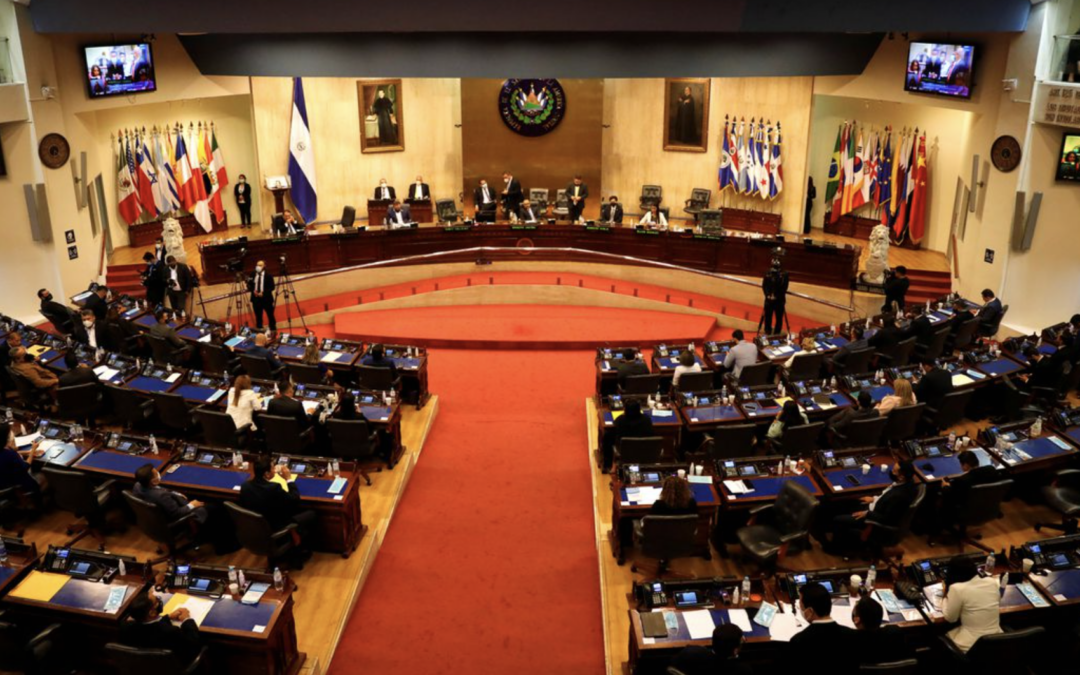
May 5, 2021 | News
The ICJ today condemned the dismissal of all five of the justices serving in El Salvador’s Supreme Court Constitutional Chamber by the country’s newly elected Legislative Assembly, backed by El Salvador’s President Nayib Bukele.
The dismissal on 2 May was justified on vague allegations of arbitrariness and dereliction of functions particularly relating to judicial decisions taken striking down government action related to the COVID-19 Pandemic. The Legislative Assembly also dismissed El Salvador’s Attorney General.
The ICJ stressed that the dismissal violated core tenets of the independence of the judiciary, by which judges are subject to dismissal only “for reasons of incapacity or behaviour that renders them unfit to discharge their duties.” (United Nations Basic Principles on the Independence of the Judiciary). Any decision must also be subject to a fair hearing of individual judges, with full due process guarantees.
The dismissal process was carried out without any individualized hearings, and without a clear expression of a legitimate basis for the dismissal.
The ICJ is concerned that this summary dismissal will undermine the independence of the judiciary, including by intimidating other judicial authorities in the country.
The dismissal of judges and the Attorney General was followed by the immediate appointment and swearing in office of other judges in replacement. This decision violates the procedural rules of selection and appointment, which are essential to safeguard the independence and impartiality of the judges serving in the Constitutional Chamber.
The decision to dismiss the judges was taken by a qualified majority of legislators, shortly after the new legislative assembly started its functions, in a swift procedure that lasted just a few hours.
The ICJ urges the government of El Salvador to restore respect to fundamental rule of law principles to prevent the arbitrary use of power and impunity.
The country is particularly vulnerable to impunity for human rights violations, where an independent judiciary is not in place to assess the lawfulness of government actions.
The ICJ calls on the responsible authorities of the Inter-American Commission for human rights and the United Nations human rights system to address the situation as a matter of priority.
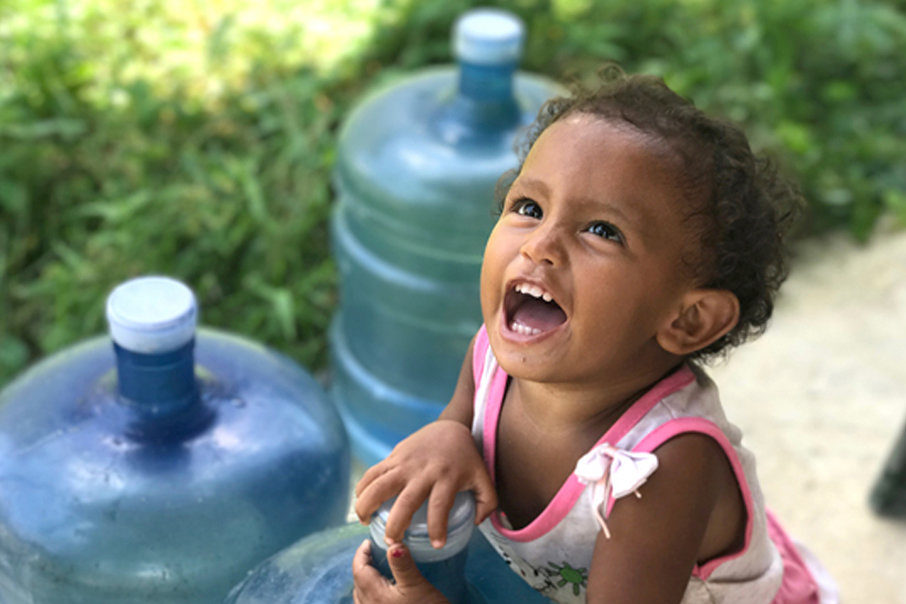
Apr 9, 2021 | Editorial, Noticias
Una opinión editorial de Carlos Lusverti, Consultor de la CIJ para América Latina
El acceso al agua potable y saneamiento es un derecho humano, sin embargo, millones de personas en Venezuela no tienen este derecho protegido o garantizado.
Una de las más importantes medidas preventivas que la Organización Mundial de la Salud ha recomendado para evitar la trasmisión del virus SARS-CoV2 es el frecuente lavado y desinfección de manos. A pesar de esto, en Venezuela millones de personas no pueden hacerlo.
En 2018, al menos el 82% de la población no recibía servicio continuo de agua y el 75% de los centros de salud públicos informó tener problemas con el suministro de agua. La Comisión Internacional de Juristas (CIJ) ha señalado problemas similares sobre el impacto de la pandemia del COVID-19 en otros lugares del mundo, por ejemplo en India y Sudáfrica, aunque la escasez de agua sigue siendo especialmente aguda en Venezuela.
En 2020, el Observatorio Venezolano de Servicios Públicos informó que el 63.8% de la población consideraba que el servicio de agua era inadecuado para enfrentar la pandemia de COVID-19 y solo el 13.6% de la población en ciudades tenía suministro regular de agua.
La Oficina de la ONU para la Coordinación de Asuntos Humanitarios (OCHA) recientemente informó que varias regiones en Venezuela tenían un acceso limitado al agua, señalando que “existía una necesidad urgente de asegurar una necesidad crítica de garantizar servicios adecuados de agua, saneamiento e higiene en salud, nutrición, instalaciones de educación y protección” (Traducción propia).
Incluso antes del inicio de la pandemia por COVID-19, el país ya estaba enfrentando una “emergencia humanitaria compleja” (una crisis humanitaria donde existe un considerable colapso de la autoridad que en Venezuela no es resultado de un desastre ambiental ni un conflicto armado), donde la falta de acceso al agua afecta al menos 4.3 millones de personas.
Impactos de la falta de agua en un sistema de salud en crisis
El agua es indispensable para el consumo doméstico, para cocinar y limpiar; también es necesaria para la protección efectiva del derecho a la salud, que ocupa un lugar central para frenar la pandemia de COVID-19. Los hospitales y otros establecimientos de salud en Venezuela tienen un acceso limitado al agua y sufren cortes del servicio eléctrico, lo cual afecta a la mayoría de los servicios de salud incluyendo las pruebas sobre COVID-19 y su tratamiento.
De acuerdo con el índice Global de Seguridad Sanitaria que evalúa las capacidades de seguridad sanitaria mundial, Venezuela ocupó el puesto 176 entre 195 países en 2019. Esto evidencia el inmenso problema que tenía el sistema de salud para abordar la devastadora emergencia de salud causada por la pandemia de COVID-19; este problema solo se exacerba por el limitado acceso limitado al agua en los establecimientos de salud.
La escasez de agua en establecimientos de salud contribuye a crear un ambiente insalubre y antihigiénico. Los centros de salud, al igual que los hogares, no pueden ser adecuadamente higienizados debido a la falta de agua y a la carencia de artículos de limpieza.
Esto incrementa drásticamente los riesgos para los trabajadores de la salud, los pacientes y, en consecuencia, para sus familias, así como para la comunidad y el público en general. Algunos servicios de salud críticos, como las instalaciones de diálisis y la cirugía en hospitales públicos, han sido cerrados o restringidos debido a condiciones insalubres, lo que ha venido limitando el acceso a los servicios de salud y ha amenazado el derecho a la salud de las personas en el país.
Human Rights Watch (HRW) ha descrito cómo las restricciones en el acceso al agua en los hospitales se han convertido en un problema creciente desde 2014. Estas restricciones pueden variar desde “fin[es] de semana y, en otras ocasiones, directamente no llega por cinco días”. HRW también encontró que “[l]a negativa a publicar datos epidemiológicos por parte de las autoridades debilita significativamente su capacidad de respuesta ante la pandemia.”
Bajo estas condiciones, los trabajadores sanitarios no pueden atender de forma segura a los pacientes de COVID-19 o disfrutar de su derecho a condiciones seguras e higiénicas de trabajo. De acuerdo con la organización Programa Venezolano de Educación Acción en Derechos Humanos (PROVEA), al menos 332 trabajadores de la salud en Venezuela han fallecido desde el comienzo de la pandemia de COVID-19 debido a la falta de equipos de protección personal y otras medidas sanitarias.
Protestas Públicas
Las compañías estatales encargadas del servicio de agua no publican ninguna clase de informes relacionados con la calidad del agua, a pesar de que las ONG locales les han requerido esa información. A través de los años se han realizado varios proyectos para mejorar la calidad del acceso al agua, algunos con financiamiento de entes internacionales como el Banco Interamericano de Desarrollo, pero las autoridades del país no han dispuesto información pública al respecto. Según Transparencia Venezuela ninguno de estos proyectos está actualmente operativo en el país.
La Alta Comisionada para los Derechos Humanos de Naciones Unidas dijo el 11 de marzo de 2021 que “el acceso a los servicios básicos, como la asistencia médica, el agua, el gas, los alimentos y la gasolina, ya escaseando, se ha visto aún más limitado por el efecto de la pandemia. Esto ha generado protestas sociales y ha agravado la situación humanitaria.”
En 2020, según el Observatorio Venezolano de Conflictividad Social, en medio de la pandemia de COVID-19 y las restricciones de encierro obligatorio, al menos 1833 protestas se realizaron en todo el país reclamando por agua potable. Frecuentemente, las autoridades resolvían estas demandas enviando agua en camiones cisterna.
La frágil situación contribuyó y agravó la falta de acceso al agua potable en el país y las condiciones de vulnerabilidad en las que viven las personas las ha obligado a salir a las calles a reclamar sus derechos en medio de la pandemia. Las protestas públicas en tiempos de pandemia crean riesgos de contraer COVID-19.
Además, en la actual situación de derechos humanos de Venezuela también plantea riesgos de detención arbitraria y uso excesivo de fuerza, que se han vuelto prácticas comunes por parte de las autoridades.
Defendiendo del derecho al agua y al saneamiento en Venezuela
Venezuela es parte del Pacto Internacional de Derechos Económicos, Sociales y Culturales y de la Convención Internacional sobre los Derechos del Niño. Ambos tratados establecen obligaciones relacionadas con el derecho al agua y al saneamiento. El Comité de Derechos Económicos, Sociales y Culturales ha descrito el derecho al agua como “una de las condiciones fundamentales para la supervivencia” y ha aclarado que los Estados deben priorizar el acceso a los recursos hídricos para prevenir “el hambre y las enfermedades“. No cualquier suministro de agua cumple con este estándar: el acceso al agua debe ser “suficiente, salubre, aceptable, accesible y asequible“.
En el contexto de la pandemia de COVID-19, el Comité ha recordado a los Estados que el derecho al agua debe incluir agua, jabón y desinfectante para todos, de forma continua. Por lo tanto, los Estados deben hacer inversiones adecuadas en los sistemas de agua y saneamiento, incluyendo el uso de la cooperación internacional para ese fin, para contrarrestar efectivamente las pandemias mundiales y mitigar el impacto de la pandemia sobre personas que viven en condiciones vulnerables.
La falta de acceso al agua es un problema de larga data en Venezuela. Las autoridades deben combinar la acción de asistencia inmediata con políticas de largo plazo para garantizar el derecho al agua potable y al saneamiento en el país, de acuerdo con estándares internacionales. Esto incluye la existencia de un mecanismo de monitoreo independiente sobre el suministro de agua en el país.
Durante la pandemia de COVID-19, las autoridades venezolanas deben implementar urgentemente políticas de emergencia para suministrar agua potable en todas las áreas con escasez de agua, sin ningún tipo de discriminación. Se debe dar prioridad a la garantía del acceso al agua en los centros de salud y al suministro de jabón, materiales de limpieza y desinfectante para manos.
Finalmente, las autoridades venezolanas deben adoptar políticas transparentes de acceso a la información pública, de manera completa y oportuna, que permitan comprender la situación epidemiológica y los datos sobre la calidad y accesibilidad del agua.
Esta opinión editorial fue originalmente publicada en el Blog de la Fundación para el Debido Proceso “JUSTICIA EN LAS AMÉRICAS”.
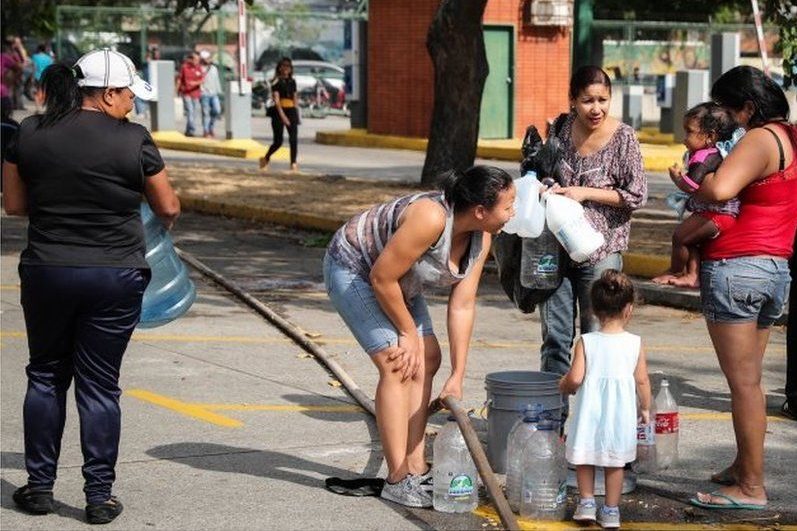
Apr 9, 2021
An opinion piece by Carlos Lusverti, ICJ Latin America consultant.
Access to safe water and sanitation is a human right, yet millions of persons in Venezuela do not have this right protected or guaranteed in the country.
One of the most important preventive measures that the World Health Organization recommends to avoid the transmission of the SARS-CoV2 virus is for people to constantly wash and sanitize hands. Despite this, millions of people cannot do this in Venezuela.
In 2018, at least 82% of the population did not receive continuous water service and 75% of public healthcare centers reported problems accessing the water supply. Similar issues have been raised by the ICJ with respect to the impact of the COVID-19 pandemic elsewhere, for example in India and South Africa.
Yet water scarcity remains particularly acute in Venezuela. In 2020, the Venezuelan Observatory of Public Services reported that 63.8% of the population considered the water service to be inadequate in the face of the COVID-19 pandemic, and a mere 13.6% of the population in cities had a regular water supply.
The United Nations Office for the Coordination of Humanitarian Affairs (OCHA) has recently reported that several regions inside Venezuela had limited access to water, indicating that “there [was] a critical need to ensure adequate water, sanitation and hygiene services in health, nutrition, education and protection facilities”.
Even before the COVID-19 pandemic arrived, the country already was facing a “complex humanitarian emergency” (a humanitarian crisis where there is a considerable breakdown of authority that in Venezuela is not due to an environmental disaster or armed conflict), and the lack of access to water affected at least 4.3 million persons.
Impacts of the lack of water on a healthcare system in critical condition
While water is needed for home consumption, cooking and cleaning, it is also required for effective protection of the right to health, which is at the very core of halting the COVID-19 pandemic. Hospitals and other healthcare facilities in Venezuela have limited access to water and suffer from electricity shortages, which affects the provision of most health services including COVID-19 testing and treatment.
According to the Global Health Security Index on the assessment of global health security capabilities, Venezuela was ranked 176th out of 195 countries in 2019.
This evidences the immense problem the healthcare system has had in addressing the devastating health emergency caused by the COVID-19 pandemic, a problem which is only exacerbated by limited access to water in health facilities.
Water shortages in health facilities contribute to an unsanitary and unhygienic environment. Healthcare centers, like homes, cannot be properly sanitized due to the lack of water and the lack of cleaning supplies. This dramatically increases the health risk for healthcare workers, patients and, consequently, their families, communities and the general public.
Some critical health services such as dialysis and surgery facilities in public hospitals have been closed or restricted due to unsanitary conditions limiting the general access to health services and threatening the right to health of persons in the country.
Human Rights Watch (HRW) has described how the restriction on access to water in hospitals has been a growing problem since 2014. This situation could vary from “an entire weekend and at other times lasting as long as five days”. HRW also found that the response of the Venezuelan authorities to COVID-19 “is severely undermined by [the authorities’] failure to publish epidemiological data, which is critical to address a pandemic.”
Under these conditions, healthcare workers cannot safely attend to COVID-19 patients, or enjoy their own rights to safe and healthy working conditions. According to Programa Venezolano de Educación Acción en Derechos Humanos (PROVEA), at least 332 health workers in Venezuela have died since the beginning of the COVID-19 pandemic due to lack of personal protective equipment and other health measures.
Public Protests
State owned companies in charge of water services do not publish any kind of reports related to water quality, even though local NGOs have requested such information.
Throughout the years, several projects, including some with international funding such as from the Inter-American Development Bank, have been established to improve the quality of access to water, but no information about it is publicly available by the country authorities. Transparencia Venezuela has reported that none of these projects are currently active in the country.
The UN High Commissioner for Human Rights said on 11 March 2021 that “access to basic services like medical assistance, water, gas, food, petrol, has continued to be scarcer, and [that] [t]his contributed to sparking social protests, and severely compounded the humanitarian situation”.
In 2020, in the midst of the COVID-19 pandemic and the lockdown restrictions, at least 1,833 different protests have taken place around the country demanding potable water, according to the Venezuelan Observatory of Social Conflict. Usually authorities resolve the demands by sending water in trucks.
The fragile situation – contributed to and worsened by the lack of access to safe water in the country and the vulnerable conditions in which people live – has compelled them to go into the streets to demand their rights in the middle of a pandemic. Public protests in the time of pandemic create risks of contracting COVID-19. And in the present human rights climate of Venezuela it also poses risks of arbitrary detention and excessive use of force, which are now common practices by the authorities.
Upholding the right to water and sanitation in Venezuela
Venezuela is party to the International Covenant on Economic, Social and Cultural Rights and the Convention on the Rights of the Child. Both treaties establish obligations related to the right to water and sanitation. The Committee on Economic, Social and Cultural Rights has described the right to water as “one of the most fundamental conditions for survival” and has clarified that States must prioritize access to water resources for preventing “starvation and disease”. Not just any water provision meets this standard: water must be “sufficient, safe, acceptable, physically accessible and affordable”.
In the context of the COVID-19 pandemic, the Committee has reminded States that the right to water must be understood to include water, soap and sanitizer for all, on a continuous basis. Thus, States must make adequate investment in water and sanitation systems, including utilizing international cooperation to that end, to effectively counter global pandemics and to mitigate the impact of the Covid-19 pandemic on persons living under vulnerable conditions.
Lack of access to water is a long-standing issue in Venezuela. The authorities should combine immediate relief action and long-term policies to guarantee the right to safe water and sanitation in the country in accordance with international standards. There should be an independent monitoring mechanism of water supply in the country.
During the COVID-19 pandemic, Venezuelan authorities must urgently implement emergency policies to provide safe water in all water-scarce areas without any type of discrimination. Priority should be given to ensuring water access in healthcare facilities and the provision of soap, cleaning materials and hand sanitizer.
Finally, Venezuelan authorities should adopt transparent policies that allow for access to public information, in a complete and timely manner, to facilitate the understanding of issues such as the epidemiological situation and data on water quality and accessibility.
This op-ed was originally published in the blog “JUSTICIA EN LAS AMÉRICAS” of the Due Process Law Foundation









